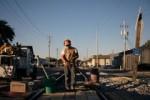What Would You Have Israel Do to Defend Itself?
Advertisement
Supported by
David Brooks
By David Brooks
Opinion Columnist
There seems to be a broad consensus atop the Democratic Party about the war in Gaza, structured around two propositions. First, after the attacks of Oct. 7, Israel has the right to defend itself and defeat Hamas. Second, the way Israel is doing this is “over the top,” in President Biden’s words. The vast numbers of dead and starving children are gut wrenching, the devastation is overwhelming, and it’s hard not to see it all as indiscriminate.
Which leads to an obvious question: If the current Israeli military approach is inhumane, what’s the alternative? Is there a better military strategy Israel can use to defeat Hamas without a civilian blood bath? In recent weeks, I’ve been talking with security and urban warfare experts and others studying Israel’s approach to the conflict and scouring foreign policy and security journals in search of such ideas.
The thorniest reality that comes up is that this war is like few others because the crucial theater is underground. Before the war, Israelis estimated Hamas had dug around 100 miles of tunnels. Hamas leaders claimed they had a much more expansive network, and it turns out they were telling the truth. The current Israeli estimates range from 350 to about 500 miles of tunnels. The tunnel network, according to Israel, is where Hamas lives, holds hostages, stores weapons, builds missiles and moves from place to place. By some Israeli estimates, building these tunnels cost the Gazan people about a billion dollars, which could have gone to building schools and starting companies.
Hamas built many of its most important military and strategic facilities under hospitals, schools and so on. Its server farm, for example, was built under the offices of the U.N. relief agency in Gaza City, according to the Israeli military.
Daphne Richemond-Barak, the author of “Underground Warfare,” writes in Foreign Policy magazine: “Never in the history of tunnel warfare has a defender been able to spend months in such confined spaces. The digging itself, the innovative ways Hamas has made use of the tunnels and the group’s survival underground for this long have been unprecedented.”
In other words, in this war, Hamas is often underground, the Israelis are often aboveground, and Hamas seeks to position civilians directly between them. As Barry Posen, a professor at the security studies program at M.I.T., has written, Hamas’s strategy could be “described as ‘human camouflage’ and more ruthlessly as ‘human ammunition.’” Hamas’s goal is to maximize the number of Palestinians who die and in that way build international pressure until Israel is forced to end the war before Hamas is wiped out. Hamas’s survival depends on support in the court of international opinion and on making this war as bloody as possible for civilians, until Israel relents.
The Israelis have not found an easy way to clear and destroy the tunnels. Currently, Israel Defense Forces units clear the ground around a tunnel entrance and then, Richemond-Barak writes, they send in robots, drones and dogs to detect explosives and enemy combatants. Then units trained in underground warfare pour in. She writes: “It has become clear that Israel cannot possibly detect or map the entirety of Hamas’s tunnel network. For Israel to persuasively declare victory, in my view, it must destroy at least two-thirds of Hamas’s known underground infrastructure.”
This is slow, dangerous and destructive work. Israel rained destruction down on Gaza, especially early in the war. Because very few buildings can withstand gigantic explosions beneath them, this method involves a lot of wreckage, compounding the damage brought by tens of thousands of airstrikes. In part because of the tunnels, Israel has caused more destruction in Gaza than Syria did in Aleppo and more than Russia did in Mariupol, according to an Associated Press analysis.
John Spencer is the chair of urban warfare studies at the Modern War Institute at West Point, served two tours in Iraq and has made two visits to Gaza during the current war to observe operations there. He told me that Israel has done far more to protect civilians than the United States did in Afghanistan and Iraq. Spencer reports that Israel has warned civilians when and where it is about to begin operations and published an online map showing which areas to leave. It has sent out millions of pamphlets, texts and recorded calls warning civilians of coming operations. It has conducted four-hour daily pauses to allow civilians to leave combat areas. It has dropped speakers that blast out instructions about when to leave and where to go. These measures, Spencer told me, have telegraphed where the I.D.F. is going to move next and “have prolonged the war, to be honest.”
The measures are real, but in addition, Israel has cut off power in Gaza, making it hard for Palestinians to gain access to their phones and information and, most important, the evacuation orders published by Israel. Israel has also........
© The New York Times






















 Toi Staff
Toi Staff Andrew Mitrovica
Andrew Mitrovica Belen Fernandez
Belen Fernandez Gideon Levy
Gideon Levy Rachel Marsden
Rachel Marsden Tarik Cyril Amar
Tarik Cyril Amar Warren J. Blumenfeld
Warren J. Blumenfeld Dr Ramzy Baroud
Dr Ramzy Baroud Patrick Gathara
Patrick Gathara Brad Glosserman
Brad Glosserman
